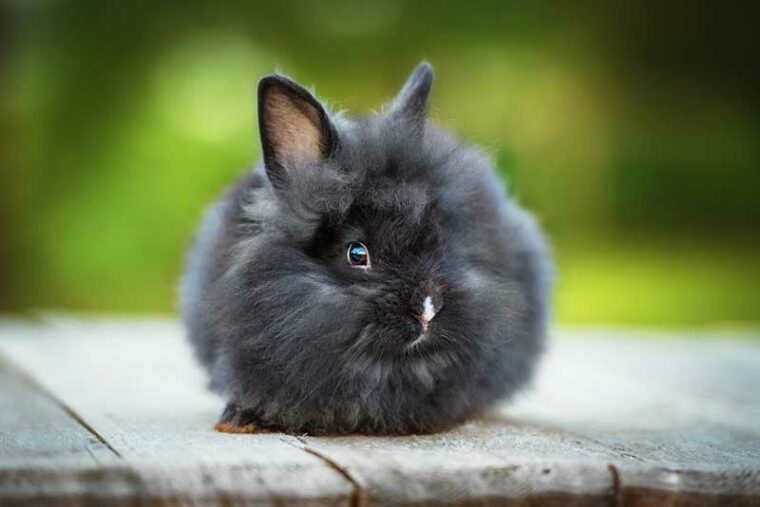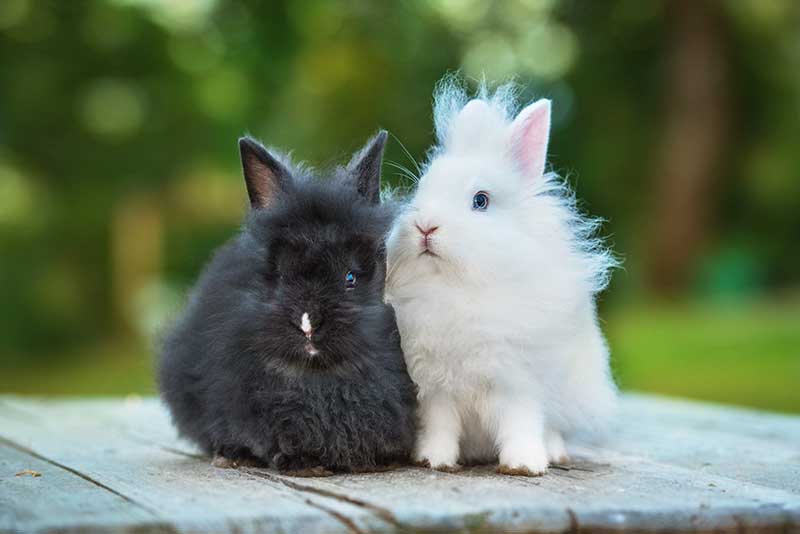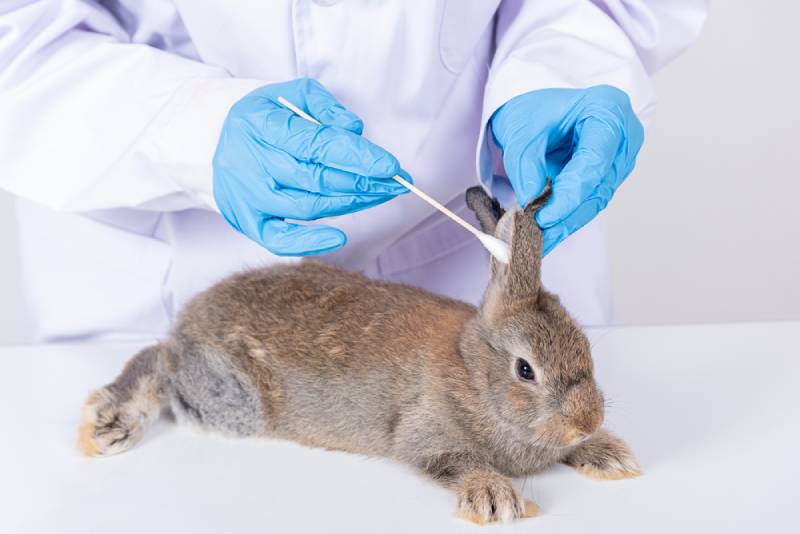
Click to Skip Ahead
The Dwarf Angora Rabbit is about as cute as they come. This small ball of fur is sure to capture your heart. It isn’t recognized by the American Rabbit Breeders Association (ARBA)—at least under that name. You’ll find it listed as the Jersey Wooly. Either way, it’s a bunny you’ll want to meet.
Breed Overview
Size:
Miniature
Weight:
Less than 3.5 pounds
Lifespan:
6–10 years
Similar Breeds:
Netherland Dwarf, Dwarf Hotot, Polish
Suitable for:
Experienced rabbit owners with other rabbits
Temperament:
Docile, friendly, easygoing
The Dwarf Angora is a cross between the Netherland Dwarf and either the French or English Angora. Eleven breeds are recognized with the latter. The Netherland Dwarf gives the animal a small size. The official standard is less than 2.5 pounds. The Angora breeds are 10.5 and 7.5 pounds, respectively. All are friendly lagomorphs, which adds to their popularity.
The parent breeds bring several other desirable traits to the cross. A small rabbit is more affordable because of their size. The luxurious coat makes the bunny more cuddly and a pleasure to hold.
Dwarf Angora Rabbit Breed Characteristics
How Much Do These Rabbits Cost?
The Dwarf Angora Rabbit took center stage at the 1984 American Rabbit Breeders’ ARBA Convention in Orlando, Florida. The breed received official recognition in 1988 as the Jersey Wooley. Enthusiasts haven’t looked back since, firmly cementing the animal’s popularity.
You may find it challenging to find a Dwarf Angora Rabbit. Demand is high for this pet, affecting the price you’ll pay. A pet that isn’t of show quality will cost around $25. However, due to the breed’s rarity, you may have to fork over much more. An animal of a good line will cost $100 or more. You can also opt to adopt a rescued rabbit.
These bunnies are typically neutered or spayed. You’ll pay less than the cost of the procedure, making it an affordable choice. They will likely run about $100 to cover this expense. However, in return, you’ll get a better pet and reduce a female’s chance of certain cancers.
Remember that responsible pet ownership is a commitment. Rabbits aren’t expensive to keep, but having one carries some necessary expenses. You can expect to pay between $50–$100 monthly for items, such as food, bedding, and toys. Bunnies must get at least their weight in hay daily to stay healthy.

Temperament & Intelligence of the Dwarf Angora Rabbit
You couldn’t ask for a sweeter pet than the Dwarf Angora Rabbit. The animal is friendly and genuinely seems to enjoy being around people. Undoubtedly, their adorable face plays a significant role in encouraging owners to handle their pets often. That goes a long way toward bonding and building trust with your bunny.
Do These Rabbits Make Good Pets? 👪
Rabbits make excellent pets. The small size of this breed makes it a slam dunk. However, we encourage you to supervise playtime with small children and make sure they know how to handle a bunny correctly. Even a little one can scratch, leaving a painful wound in their wake if they get scared or irritated. Lagomorphs are social animals, so you may want to consider getting more than one.
Does This Rabbit Get Along With Other Pets?
Even pet rabbits are in touch with their wild side when it comes to interacting with other animals. Remember that they are prey species and have those instincts. Your bunny may want to make friends with your other pets. However, cats and dogs are predators at heart and may chase a rabbit that runs from them.
Things to Know When Owning a Dwarf Angora Rabbit:
These rabbits may be small, but they still need daily care. If you plan on getting only one bunny, remember that you must provide the social element in the pet’s life. That means handling your bunny and offering mental stimulation. Toys and playtime in the house or outside in a pen are excellent ways to satisfy this need to ensure the animal’s quality of life.
Food & Diet Requirements 🥕
Like many animals, rabbits can synthesize many of the vital nutrients they need, such as the B-complex vitamins and vitamins C and K. However, their diet must ensure they get adequate amounts of several others, including vitamins A, D, and E. Hay should account for most of your pet’s food intake. It will support good digestive health and keep your bunny’s teeth in check.
Timothy hay is preferable for adult animals. It’ll provide the correct balance of nutrients and calories. You can offer your bunny fresh greens, like kale and endive, daily. However, you should limit their intake of vegetables with high oxalate content, such as spinach. Overconsumption can increase your pet’s risk of urinary stones. A commercial pellet diet can cover the balance of your bunny’s nutritional needs.

Habitat & Hutch Requirements 🏠
The cage will probably be your biggest expense when getting a bunny as a pet. The minimum size cage for a Dwarf Angora Rabbit is 24 inches L x 18 inches W. It should have a solid floor instead of wire, which can hurt your pet’s feet. You should also put a litter box inside of it since you can train a bunny to use one. A hiding place is essential to help your rabbit feel secure in its new home.
Lagomorphs tolerate cold better than heat, thanks to their thick coats. Average household temperatures work well for bunnies. We recommend following the 150-point rule. Conditions are likely okay as long as the temperature and humidity figures don’t add up to more than 150.
You may not need bedding if you keep your pet indoors. It’s usually an issue for outdoor rabbits to help them stay warm. Besides, you may have a tougher time getting your bunny to use a litter box. However, proper sanitation is imperative for these animals. Treating illnesses is challenging because of the effects of medications on the animal’s digestive health.
Exercise & Sleeping Needs 🐇
Your bunny should spend time outside its cage or hutch daily for some welcome exercise. You can use a pen outdoors or a bunny-proofed room indoors. Rabbits like to chew because it probably feels good. It also helps to keep their teeth trim since they grow the animal’s entire life. We suggest at least an hour a day to give your rabbit time to stretch their legs.
Your bunny will likely make the hiding place their bed. Rabbits sleep about 12–14 hours daily, most of which is light. They may also keep their eyes open while they do. That’s another reflection of the animal’s prey instincts.
Training 🥎
Litter box training is easy-peasy with rabbits since it falls in line with their natural inclination to use one area. That will make cleaning your pet’s cage a snap. You can also train your bunny. Treats are a powerful convincer. However, they shouldn’t make up more than 10% of your rabbit’s diet. Fruits, like apples and blueberries, are excellent choices. It’ll also help you bond with your pet.
Grooming ✂️
You should comb your Dwarf Angora Rabbit regularly to prevent mats and keep their coat looking its best. It’s also a practical way to avoid serious health conditions like gastrointestinal stasis or wool block. Lagomorphs self-groom, not unlike cats. That makes them susceptible to an ailment felines often get—hairballs. Swallowed hair can cause life-threatening blockages. Brushing can help prevent this.
If your bunny doesn’t spend a lot of time outdoors, you’ll probably have to trim their nails. We suggest getting your pet used to being handled when young to make this task easier. Of course, it’s also another good way to use treats.

Lifespan and Health Conditions 🏥
Feeding your bunny a healthy diet and keeping the cage clean will ensure a good quality of life for your pet. Sanitation is paramount. The Dwarf Angora Rabbit is typically a healthy animal. Nevertheless, we recommend only buying from reputable sellers who take the necessary precautions to prevent overbreeding or encouraging offspring in unhealthy animals.
 Male vs. Female
Male vs. Female
Spaying and neutering will make all the difference in ensuring a good pet. Both sexes can become aggressive during the mating season. Males may also spray. The surgery can remedy both issues. Either one will make a good pet. Handling and bonding with your bunny will ensure the animal stays friendly and doesn’t become a biter.
3 Little-Known Facts About the Dwarf Angora Rabbit
1. ARBA Recognizes Six Color Groups for the Jersey Wooley
The color groups include Agouti, Broken, Self, Shaded, Tan, and Any Other Variety (AOV).
2. ARBA Classifies the English Angora as a Compact Breed
The English Angora is the smallest of the four recognized by the organization. It’s also the only one classified as a compact breed.
3. Scientists Aren’t Sure Exactly When Humans Domesticated Rabbits
Although many accounts of people and rabbits exist, scientists are not exactly sure how domestication occurred or whether it happened several times throughout history.
Final Thoughts
The Dwarf Angora Rabbit is an adorable animal that will make a great addition to your home. They are as sweet and docile as they look. The care for this breed applies to any other bunny. The main difference comes with the rabbit’s longer coat. Regular grooming is necessary. Besides, it’ll give you more opportunities to snuggle with your animal companion.
See also:
- Palomino Rabbit: Pictures, Facts, Lifespan, Behavior & Care Guide
- Riverine Rabbit: Temperament, Pictures, Habitat & Lifespan
Featured Image Credit: Rita_Kochmarjova








